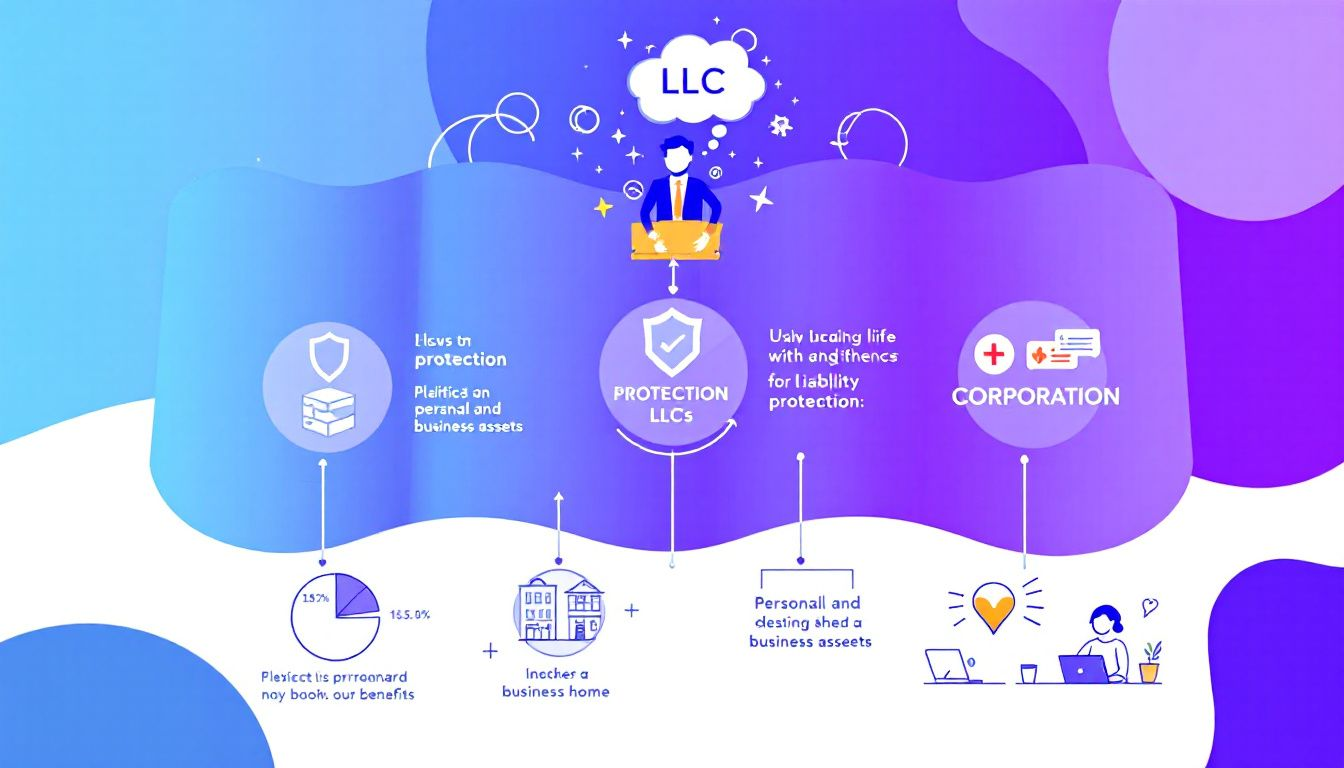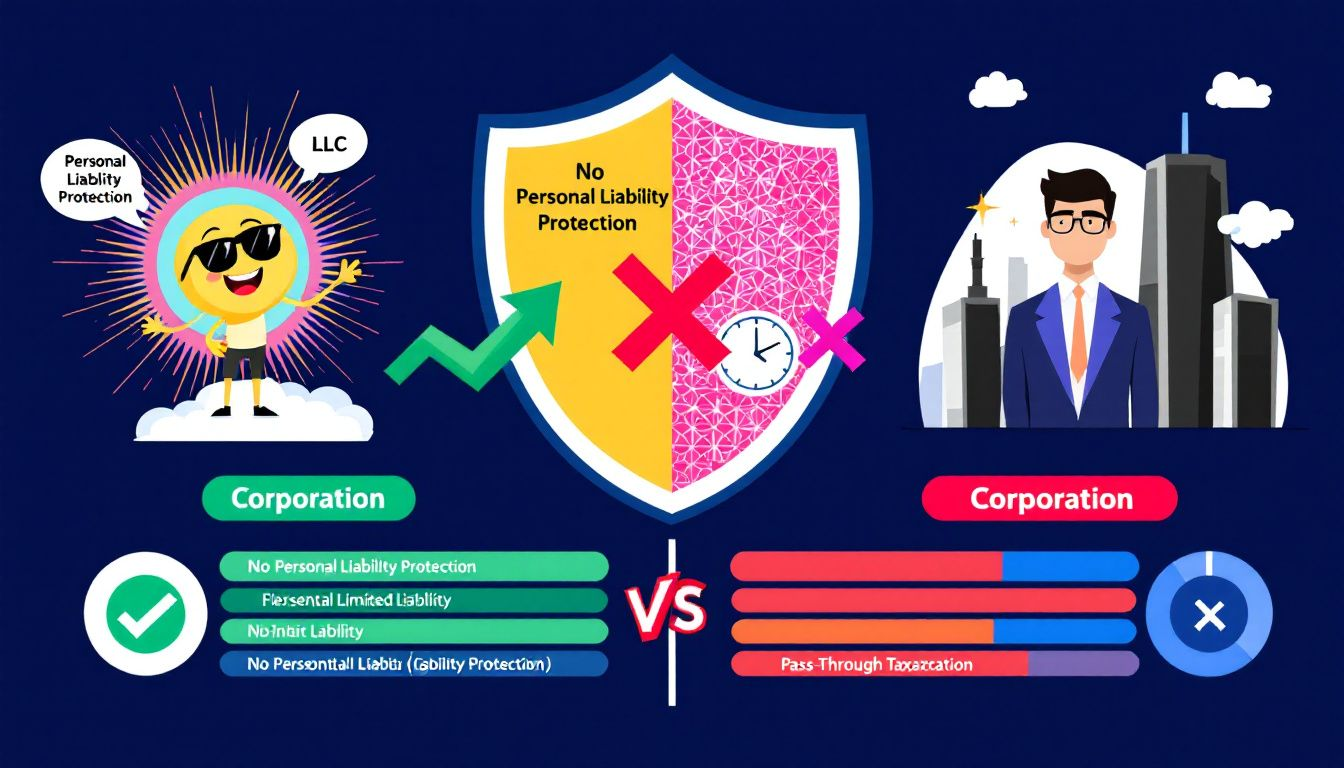LLC vs Corp: Which Business Structure Is Best for You?
Deciding between an LLC vs Corp? This guide will help you understand the key differences in liability, taxes, and management. Learn which business structure meets your needs best.
Key Takeaways
- LLCs offer personal liability protection, flexible management, and pass-through taxation, making them a preferred choice for small businesses seeking simplicity and efficiency.
- Corporations provide a structured framework for large-scale operations, allow easier capital raising through share issuance, but are subject to double taxation and stricter compliance requirements.
- Choosing between an LLC and a corporation depends on business goals, with LLCs favoring flexibility and management ease, whereas corporations are better suited for attracting investors and facilitating significant growth.
Understanding Limited Liability Companies (LLCs)

A Limited Liability Company (LLC) is a popular business entity among small business owners due to its unique blend of benefits from both corporations and partnerships. The primary allure of an LLC is its ability to provide personal liability protection to its owners, ensuring that personal assets are generally shielded from business debts and obligations. This structure is particularly appealing for medium or higher-risk businesses seeking lower tax rates compared to corporations, especially when considering the LLC vs other business structures.
One of the standout features of LLCs is their management flexibility and simpler tax treatment compared to corporations. Unlike more rigid corporate structures, LLCs allow for a more relaxed approach to management and fewer formalities, making them an ideal choice for many small businesses. This flexibility also applies to taxes, as LLCs benefit from pass-through taxation and avoid the double taxation commonly faced by corporations.
The combination of limited liability protection and operational flexibility makes LLCs an attractive option for business owners who value simplicity and efficiency. Forming an LLC allows entrepreneurs to concentrate on business growth without dealing with extensive corporate formalities.
Formation Process
Establishing an LLC involves filing articles of organization with the relevant state authority. This document is crucial as it officially registers the business entity and sets out basic details such as the company name, address, and members’ names.
Although not required in all states, creating an operating agreement is highly recommended. This agreement outlines the management structure and operational guidelines for the LLC, helping to prevent disputes among members and providing clarity on the roles and responsibilities within the business. Additionally, having operating agreements can further enhance the organization’s framework.
Management Structure
LLCs offer unparalleled flexibility in their management structure, allowing them to be managed either by their members or by appointed managers. This flexibility enables business owners to tailor the management setup to fit their specific needs and preferences.
In a member-managed LLC, all members handle daily operations. In contrast, a manager-managed LLC allows members to appoint managers for business operations, enabling them to focus on other aspects.
Taxation
Taxation is one of the significant advantages of forming an LLC. Typically treated as pass-through entities for tax purposes, LLCs allow income to be reported directly on members’ personal tax returns, thereby avoiding the corporate tax. LLCs are typically taxed as partnerships under Subchapter K but can opt to be taxed as a corporation if it benefits the business.
This flexibility in tax treatment makes LLCs particularly attractive for small business owners who prefer a straightforward tax process.
Understanding Corporations

A corporation is a distinct legal entity, separate from its owners, that can make a profit, be taxed, and be held legally liable. Corporations are chartered by the state and have legal rights similar to those of a person, such as entering contracts, owning assets, and being sued. The term corporation encompasses various types, including C corporations, S corporations, and nonprofit corporations, each with its own set of rules and benefits.
One of the primary advantages of corporations is their ability to raise capital more efficiently than other business entities. This is especially true for C corporations, which can issue multiple classes of stock and attract professional investors. Additionally, corporations provide a clearer structure for large-scale operations, making them suitable for businesses with significant growth aspirations.
However, corporations also face extensive regulations from tax authorities and must adhere to stringent compliance requirements. This can be a double-edged sword, offering stability and credibility while also imposing a heavier administrative burden.
Formation Process
Forming a corporation involves filing legal paperwork with the state, most notably the articles of incorporation. This document lays the foundation for the corporation, detailing essential information such as the corporation’s name, purpose, stock structure, and the names of the incorporators.
These formation documents officially establish the business as a corporation, granting it legal status for various activities.
Management Structure
Corporations have a formal management structure that includes a board of directors and appointed officers. The board of directors, elected by the shareholders, is responsible for overseeing the corporation’s overall direction and ensuring that it fulfills its fiduciary responsibilities.
The board appoints officers to manage the day-to-day operations of the corporation, creating a clear hierarchy and division of responsibilities within the business.
Taxation
Taxation is a critical aspect of corporate structure, particularly for C corporations, which often face double taxation. This means that the corporation pays taxes on its profits at the corporate level, and then shareholders also pay taxes on any dividends received, leading to taxation at both the corporate and personal levels.
Conversely, S corporations can avoid this double taxation by allowing income to be reported on shareholders’ individual tax returns, similar to LLCs.
Ownership Differences Between LLCs and Corporations

The ownership structures of LLCs and corporations are fundamentally different, influencing how they operate and grow. An LLC is owned by its members, who hold membership interests that can be defined flexibly. This structure allows for a more collaborative approach, where members can contribute to the business in various capacities without strict adherence to formal roles.
Corporations, on the other hand, are owned by shareholders who hold shares of stock. This ownership model is more structured, facilitating the easy transfer of ownership through the sale of shares. It is particularly advantageous for businesses looking to attract professional investors and raise significant capital.
LLC Ownership
In an LLC, ownership is held by members, and there is no maximum limit on the number of members that can participate. This flexibility allows for diverse ownership arrangements, with membership interests reflecting each member’s contribution and role within the business.
Additionally, LLCs permit unequal profit distributions among members, regardless of their capital contributions, providing a tailored approach to profit-sharing and decision-making.
Corporation Ownership
Corporations are owned by shareholders who receive shares of stock in exchange for their investment. This structure enables easy transferability of ownership, as shareholders can sell their stock without affecting the corporation’s operations.
Issuing shares and attracting professional investors make corporations ideal for businesses aiming to raise substantial capital and expand.
Liability Protection in LLCs vs. Corporations

Both LLCs and corporations provide significant liability protection, shielding owners from personal liability related to business debts and legal issues. This limited liability protection is a cornerstone of both structures, ensuring that personal assets are generally not at risk if the business faces financial difficulties or lawsuits.
However, it’s essential to maintain proper compliance with recordkeeping and operational requirements to preserve this protection. Failing to uphold business formalities or engaging in fraudulent activities can lead to a legal concept known as veil piercing, where courts hold owners personally liable despite the limited liability status.
Limited Liability Protection
Limited liability protection ensures that business owners are generally not personally responsible for business obligations, a key feature of both LLCs and corporations. This protection safeguards personal assets from business-related debts and lawsuits, provided that owners comply with necessary business formalities and avoid fraudulent activities, including liability protections.
Maintaining proper records and adhering to legal requirements are essential to preserving this limited liability status.
Veil Piercing
Veil piercing is a legal decision where a court disregards the limited liability status of a corporation or LLC, allowing personal liability for the owners or shareholders. This typically occurs in cases of commingling personal and business finances, lack of corporate formalities, or using the company to perpetrate fraud.
Clear separation of personal and business activities is vital to avoid veil piercing and protect personal assets.
Ongoing Compliance and Recordkeeping Requirements
Ongoing compliance and recordkeeping requirements vary significantly between LLCs and corporations. Corporations generally have stricter requirements, including holding annual shareholder meetings, maintaining detailed records, and adhering to extensive regulatory standards. This can impose a heavier administrative burden but also provides a clear framework for operations and accountability.
In contrast, LLCs benefit from more relaxed recordkeeping standards, allowing owners to focus more on business operations rather than extensive paperwork. This flexibility can be particularly advantageous for small business owners who prefer a simpler and less formal business structure.
LLC Requirements
LLCs have minimal recordkeeping and annual requirements, making them an attractive option for small business owners seeking simplicity and flexibility. Unlike corporations, LLC owners do not have to hold regular meetings, and the paperwork requirements are significantly less burdensome.
This enables LLCs to operate more easily and concentrate on growth without extensive compliance obligations.
Corporation Requirements
Corporations, on the other hand, face more extensive recordkeeping and operational processes. These include hold annual shareholder meetings, recording stock issues and transfers, filing annual reports, and maintaining detailed corporate records.
Although demanding, these requirements offer a structured and transparent framework, enhancing the corporation’s credibility and efficiency.
Tax Considerations for LLCs and Corporations
Tax considerations are a crucial factor when choosing between an LLC and a corporation. LLCs offer flexibility in tax treatment, typically benefiting from pass-through taxation, which avoids the corporate tax. This means that profits and losses pass through to the members’ personal tax returns, simplifying the tax process and potentially reducing overall tax liability.
Corporations, particularly C corporations, face double taxation, where profits are taxed at both the corporate and individual shareholder levels. However, S corporations can avoid this by allowing income to be reported on shareholders’ personal tax returns, similar to LLCs.
Understanding these tax implications is crucial for choosing the best structure for your business.
Pass-Through Taxation for LLCs
LLCs benefit from pass-through taxation, meaning the company’s profits and losses are reported on the members’ personal tax returns without incurring corporate tax. Members are taxed based on their ownership percentage, simplifying the process and often proving more favorable than corporate taxation.
Additionally, multi-member LLCs are taxed as partnerships, further simplifying the tax obligations.
Corporate Taxation
Corporations pay corporate income tax on profits and sometimes face the challenge of double taxation. This occurs when profits are taxed at the corporate level, and then again on shareholders’ personal tax returns when dividends are distributed.
The current corporate tax rate in the U.S. is 21 percent, which corporations must pay on their profits before any dividends are issued. This tax structure can be less favorable for small businesses compared to the pass-through taxation of LLCs and corporate taxes.
S Corporation Election
Electing S corporation status allows a corporation to avoid double taxation by passing income directly to shareholders’ personal tax returns. To qualify, a corporation must have a single class of stock and no more than 100 shareholders.
Achieving S corp status involves filing IRS Form 2553, which enables the business to benefit from the same tax advantages as LLCs while maintaining the corporate structure.
Choosing the Right Business Structure

Choosing the right business structure and business structures requires careful consideration of your business goals, operational preferences, and long-term vision. LLCs generally offer more tax flexibility and ease of management, making them a popular choice for small businesses and entrepreneurial ventures. On the other hand, corporations are more suited for those looking to raise capital and expand, thanks to their ability to issue shares and attract professional investors.
A business attorney can help reduce risks by assisting in selecting the right structure and preparing a tailored business plan. This professional guidance ensures that you make an informed decision that aligns with your business goals and provides the best foundation for future growth.
Attracting Investors
The ability to attract investors is a crucial consideration when choosing between an LLC and a corporation. Corporations are often preferred by outside investors due to the ease of transferring shares and the perpetual life of the business entity. Although LLCs can attract investment, their structural limitations in issuing shares can make raising significant capital more challenging.
Businesses planning to attract investors should carefully weigh these factors to determine the best structure for their capital-raising needs.
Business Goals and Flexibility
Defining clear business goals is essential in choosing the right business structure. LLCs provide greater flexibility in management and operations, making them ideal for entrepreneurial ventures that require quick adaptability. Conversely, corporations, with their structured hierarchy and compliance requirements, may limit operational flexibility but are beneficial for larger businesses with complex goals.
The ability to pivot and adapt to market changes is often more straightforward for LLCs, making them attractive for dynamic business environments.
Summary
In summary, both LLCs and corporations offer unique advantages and potential drawbacks, making the choice between them highly dependent on your specific business needs and goals. LLCs provide flexibility, simpler tax treatment, and robust liability protection, making them ideal for small businesses and those seeking operational ease. Corporations, on the other hand, offer a more structured framework, making them better suited for businesses aiming to raise significant capital and expand.
Ultimately, the decision should be based on a thorough evaluation of your business objectives, financial goals, and the level of formality you are willing to maintain. Consulting with a business attorney can provide valuable insights and help you navigate the complexities of choosing the right business structure, ensuring that you lay a solid foundation for your business’s future success.
Frequently Asked Questions
What is the main difference between an LLC and a corporation?
The main difference between an LLC and a corporation is that LLCs provide flexibility in management and taxation, whereas corporations are more structured and advantageous for raising capital. This distinction can significantly impact your business’s operational and financial strategy.
How does taxation differ between LLCs and corporations?
Taxation differs significantly between LLCs and corporations; LLCs typically enjoy pass-through taxation, whereas corporations are subject to double taxation unless they elect S corporation status. This distinction can impact the overall tax liability of the business entity.
Can an LLC be converted to a corporation?
Yes, an LLC can be converted to a corporation, but this process entails specific legal and tax considerations that must be carefully evaluated.
What is the role of the board of directors in a corporation?
The board of directors plays a crucial role in managing the corporation and is responsible for appointing officers to oversee daily operations. Their oversight ensures that the organization operates in alignment with its objectives and regulations.
Are there ongoing compliance requirements for LLCs?
Yes, LLCs do have ongoing compliance requirements, though they are typically less stringent than those for corporations. It is essential to remain aware of and fulfill these obligations to maintain good standing.








 CHAT WITH US
CHAT WITH US